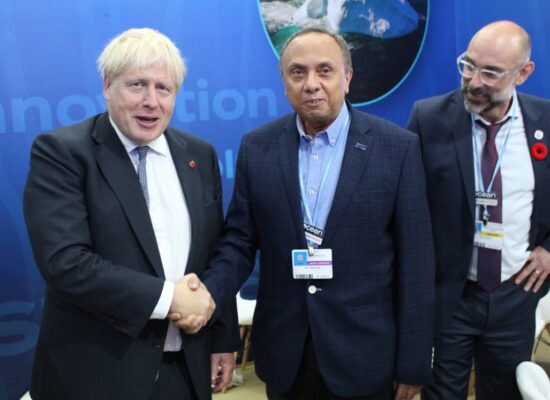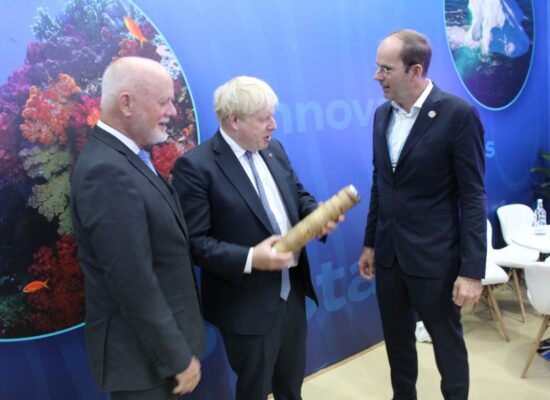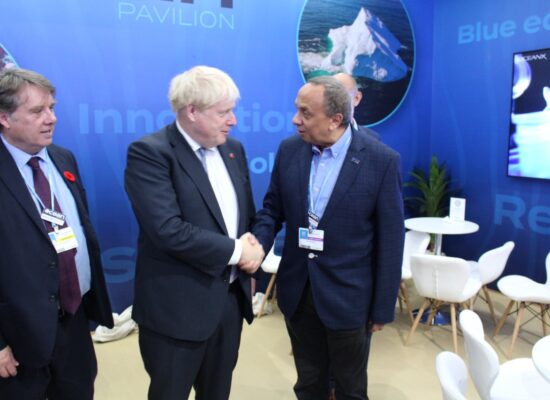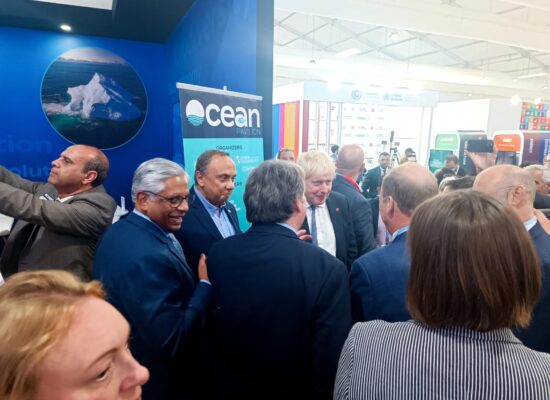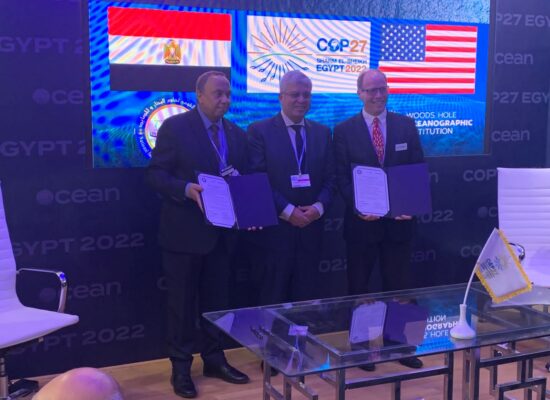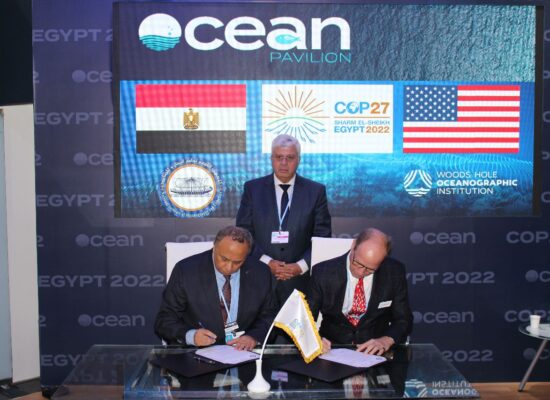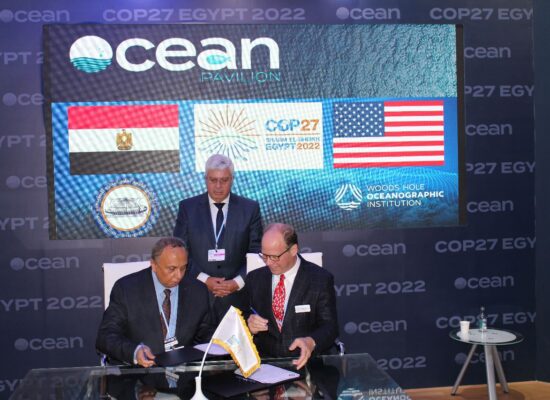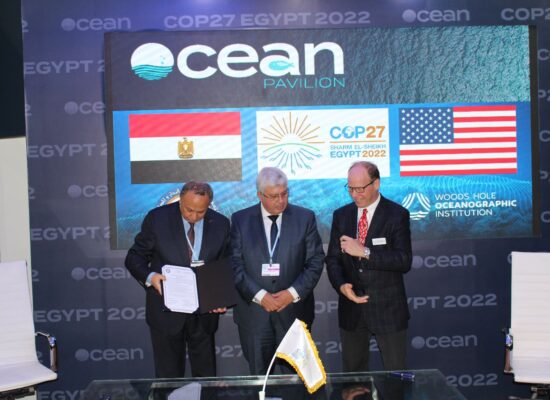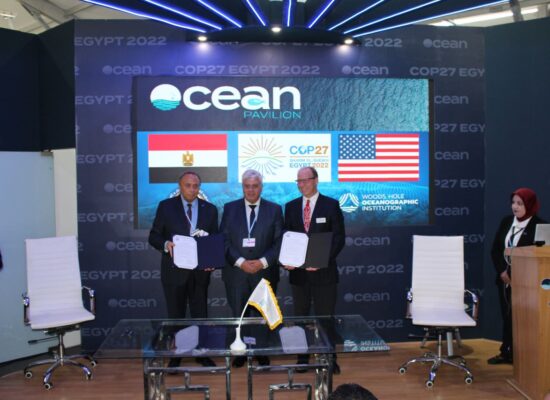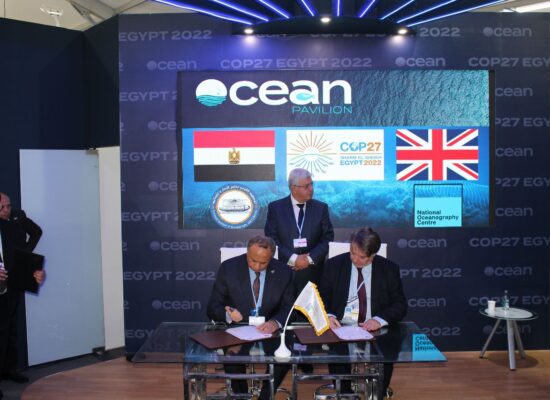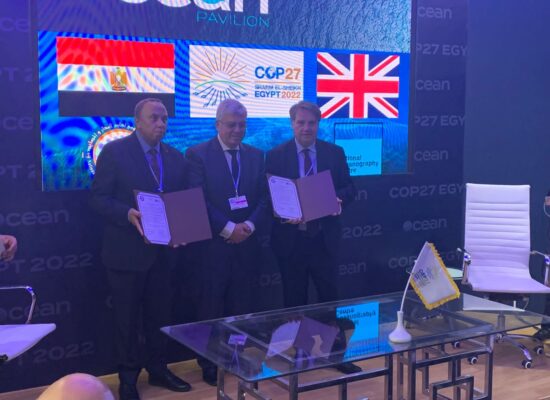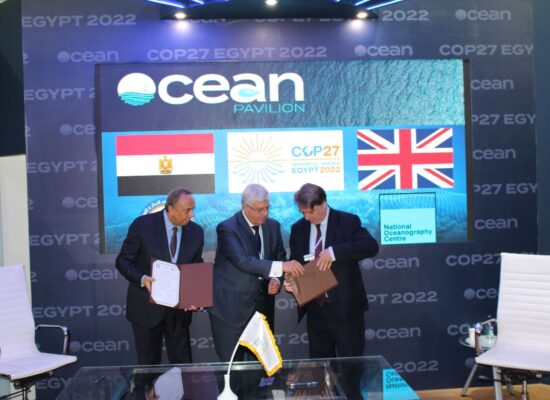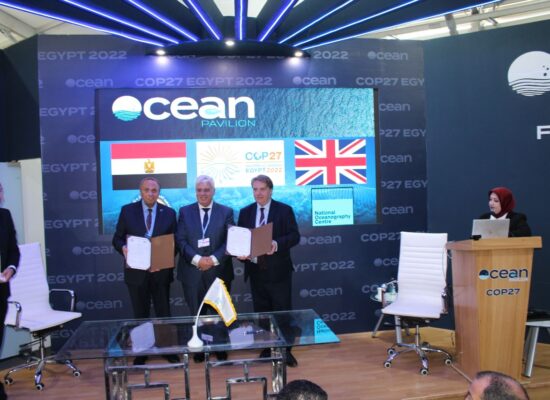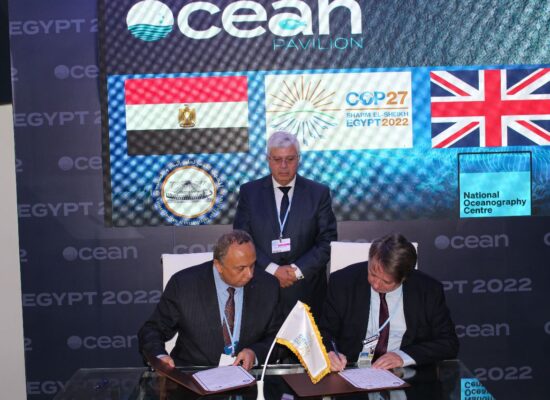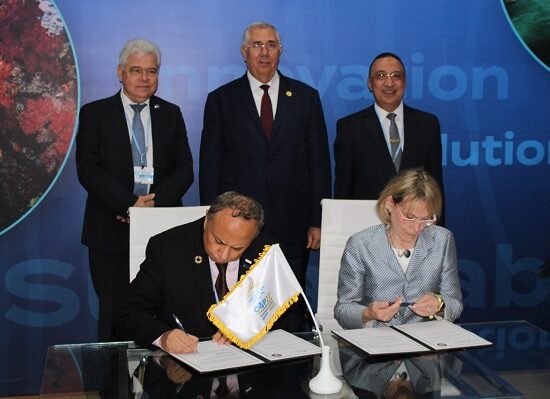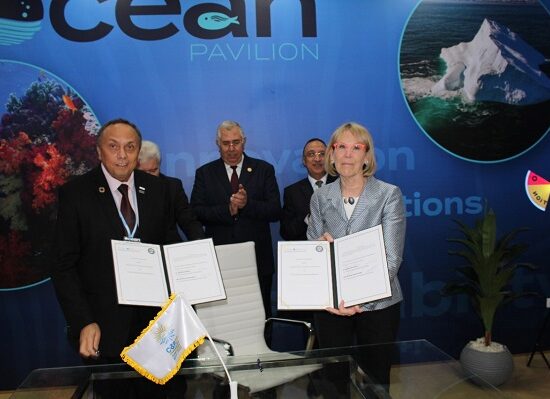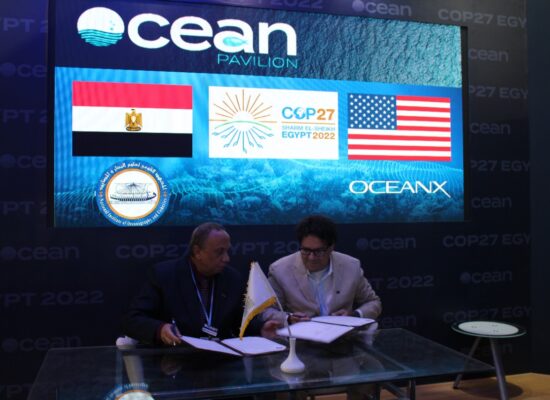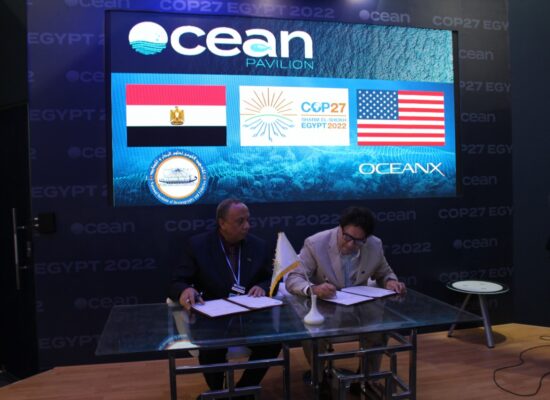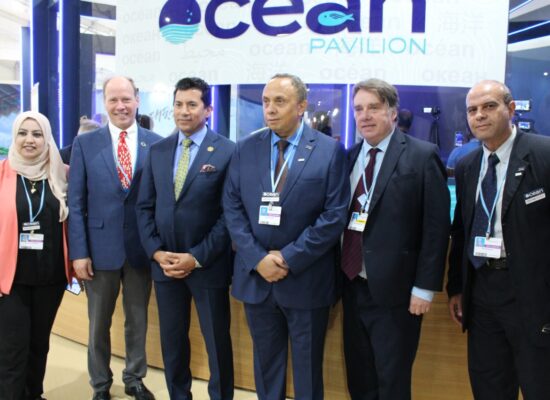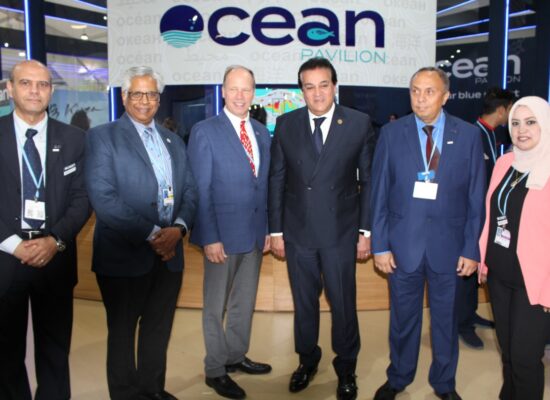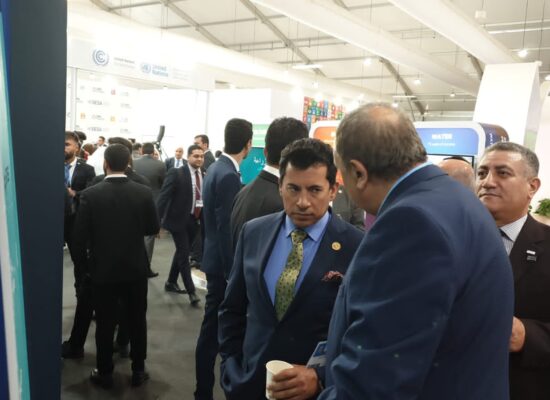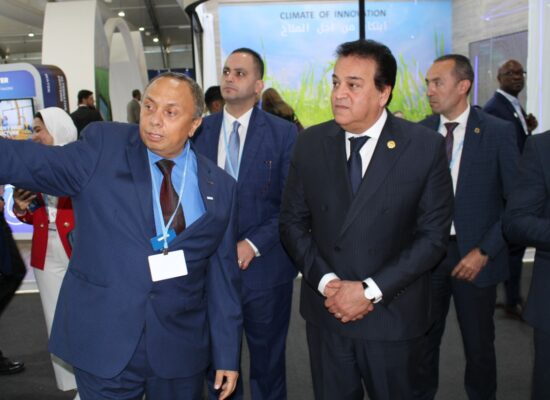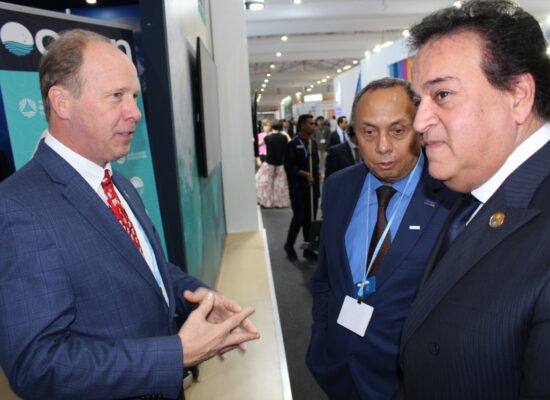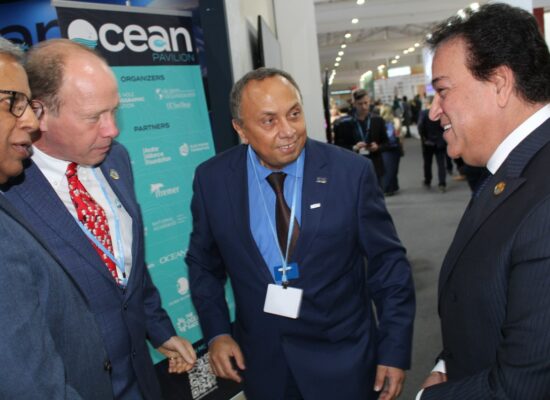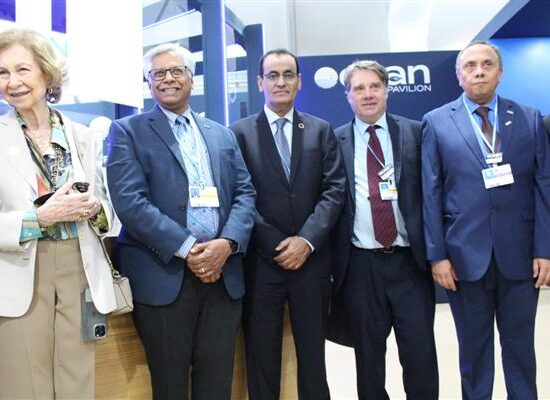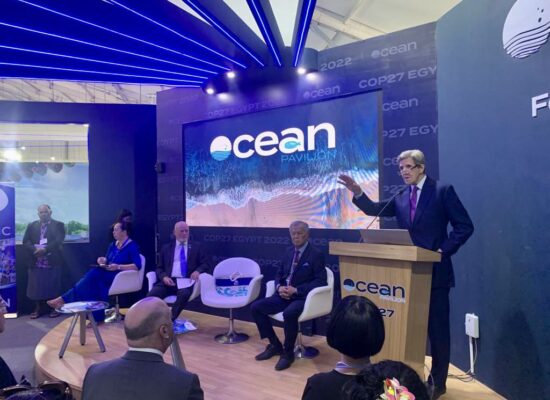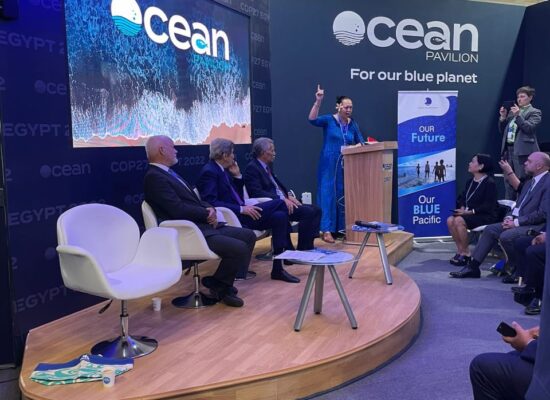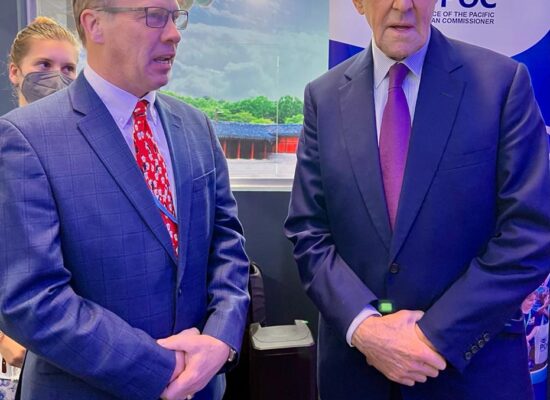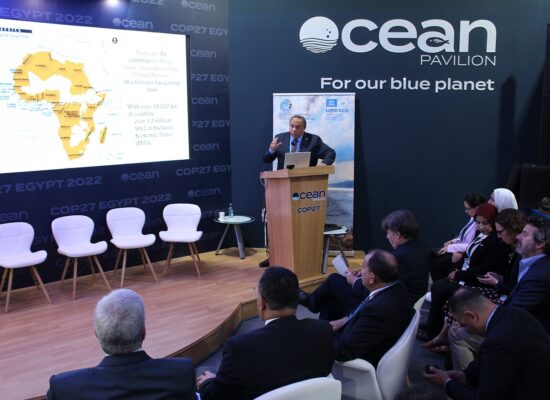Boris Johnson visits the oceans pavilion at the Climate Summit and supports Egypt's measures to confront climate change
Boris Johnson, the former British Prime Minister and currently participating in the COP27 climate conference, visited the oceans pavilion at the conference and declared his support for all measures taken by the Egyptian government represented by the Institute of Oceanography and Fisheries to protect the seas and oceans from climate changes.
Johnson expressed his happiness at organizing a pavilion for ocean sciences for the first time at the COP27 climate conference, which he described as an important step for sharing scientific expertise, discussing studies and scenarios, and developing programs and radical solutions to reduce the effects of climate change and protect coral reefs.
And prof. Dr. Amr Zakaria, President of the National Institute of Oceanography and Fisheries: The allocation of a pavilion for the oceans under the management of the United Nations at the current climate conference in Sharm El-Sheikh is the first of its kind and this did not happen in the history of previous climate conferences.
“We aim to develop programs to protect marine wealth and projects funded by financing agencies, in addition to explaining the danger of increasing acidity that affects coral reefs, in addition to how to limit the rise in sea levels that threaten coastal cities,” Hamouda added.
On the sidelines of the Climate Summit.. Memorandum of Understanding between the Egyptian NIOF and the American Woods Hole Foundation
Dr. Ayman Ashour, Minister of Higher Education and Scientific Research, witnessed the signing of a protocol for cooperation between the National Institute of Oceanography and Fisheries and the Woods Hole Institute in the United States, which is the first institution in the field of science seas and marine explorations.
The minister also witnessed the signing of a cooperation protocol between the institute and the National Center for Oceanography in England, headed by Dr. Peter Eide, head of the center.
This comes within the activities and events of the National Institute of Marine Sciences, headed by Dr. Amr Zakaria Hammouda, in the blue region at the COP27 Conference of the Parties to the United Nations Framework Convention on Climate Change, which is currently being held in Sharm El-Sheikh.
The cooperation protocols aim to enhance and support joint scientific cooperation in the field of marine sciences, develop programs to reduce climate change, protect all marine organisms, preserve coral reefs and the living resources of the seas, as well as assist Egyptian researchers in working on advanced research ships in for Woods Hole as they carry out scientific research in the high seas and oceans.
This comes within the activities and events of the National Institute of Marine Sciences, headed by Dr. Amr Zakaria Hammouda, in the blue region at the COP27 Conference of the Parties to the United Nations Framework Convention on Climate Change, which is currently being held in Sharm El-Sheikh.
The cooperation protocols aim to enhance and support joint scientific cooperation in the field of marine sciences, develop programs to reduce climate change, protect all marine organisms, preserve coral reefs and the living resources of the seas, as well as assist Egyptian researchers in working on advanced research ships in for Woods Hole as they carry out scientific research in the high seas and oceans.
The institute holds several discussions on the status of the African coasts and the challenges they face and the future vision for the sustainable development of those coasts, including the “challenges of the ocean contract and regional priorities”, which discuss a number of issues such as pollution, biodiversity, climate change, food security, sustainable development of the oceans, and monitoring oceans systems, digital representation of the oceans, capacity development and ocean literacy, and a “future vision for solutions facing the African coasts” aimed at the cooperation of all parties in various disciplines to identify the capabilities of the African continent and the development needs of the continent, and “enhance the sustainability of ocean sciences through innovation and capacity development.” Which highlights the importance of the role of ocean science, new methodologies and opportunities for communication and collaboration with ocean actors with the participation of industry, as well as discussing the importance of ocean-based investments through research and initiatives around them.
On the sidelines of the Climate Summit.. Memorandum of Understanding between the Egyptian NIOF and the American Woods Hole Foundation
Dr. Ayman Ashour, Minister of Higher Education and Scientific Research, witnessed the signing of a protocol for cooperation between the National Institute of Oceanography and Fisheries and the Woods Hole Institute in the United States, which is the first institution in the field of science seas and marine explorations.
The minister also witnessed the signing of a cooperation protocol between the institute and the National Center for Oceanography in England, headed by Dr. Peter Eide, head of the center.
The minister also witnessed the signing of a cooperation protocol between the institute and the National Center for Oceanography in England, headed by Dr. Peter Eide, head of the center.
This comes within the activities and events of the National Institute of Marine Sciences, headed by Dr. Amr Zakaria Hammouda, in the blue region at the COP27 Conference of the Parties to the United Nations Framework Convention on Climate Change, which is currently being held in Sharm El-Sheikh.
The cooperation protocols aim to enhance and support joint scientific cooperation in the field of marine sciences, develop programs to reduce climate change, protect all marine organisms, preserve coral reefs
The national Institute of Oceanography and Fisheries” cooperates with the American Scripps Institute to transfer research technology for sunken antiquities
The National Institute of Oceanography and Fisheries headed by Dr. Amr Zakaria Hammouda signed a memorandum of understanding with the Scripps Institute, the largest and most prestigious American institute, which was established in 1903.
The signing was attended by Mr. El-Koseir, Minister of Agriculture, Major General Mohamed Sherif, Governor of Alexandria, and UNESCO Secretary-General for Marine Sciences.
The memorandum of understanding included the transfer of modern technology in the field of research and exploration of all natural resources in the seas, whether fisheries pools or mineral wealth and sunken antiquities, on the sidelines of the climate summit currently held in Sharm El-Sheikh.
The minister also witnessed the signing of a cooperation protocol between the institute and the National Center for Oceanography in England, headed by Dr. Peter Eide, head of the center.
Zakaria said that the memorandum comes in the desire of the state and the institute to transfer and benefit from the technology of advanced research institutes in this field, which covers all research fields related to the field of marine sciences, whether in the field of fish farming or research and detection of fish populations in addition to detection in the field of mining wealth and sunken antiquities that contains great wealth along the Egyptian coasts.
Zakaria added that through this research cooperation between the two sides, cadres of young researchers at the institute will be trained to benefit from them in transferring modern technology to the institute and implementing it on its research ships (Salsabil and Yarmouk), which contributes to studying the nature of marine organisms and developing programs to reduce climate change and protect all marine organisms and the preservation of coral reefs and the living resources of the seas, in addition to the discovery of mineral wealth and sunken antiquities.
The National Institute of Oceanography and Fisheries signs a memorandum of understanding with the Ocean X Institute for Documentary Filming
The National Institute of Oceanography and Fisheries, headed by Prof. Amr Zakaria Hamouda, signed a memorandum of understanding with the Ocean X Institute, which is responsible for making documentary films for marine sciences for the benefit of “National Geographic” on the sidelines of the Climate Summit currently being held in Sharm El-Sheikh.
Prof. Amr Zakaria said that this memorandum comes in the institute’s desire to transfer and get benefit from the technology of advanced research institutes in the field of recording “National Geographic” documentaries by training scientific research Staff on how to document research trips carried out by the institute with its research ships (Salsabil and Yarmouk) and documenting them in Photographing the Egyptian coasts and beaches and making documentaries about them, which will contribute to studying the nature of marine organisms and developing programs to reduce climate change, protect all marine organisms, preserve coral reefs and the living resources of the seas.
The “Oceans Pavilion” at the Climate Summit attracted the attention of ministers and parliamentarians
Dr. Ashraf Sobhi, Minister of Youth and Sports, visited the Oceans Pavilion at the Climate Summit held in Sharm El-Sheikh, and issued directives to quickly prepare youth programs for training and awareness of the importance of preserving and developing the Egyptian coasts, expressing his admiration for the organization of the Oceans Pavilion and the efforts of the National Institute of Oceanography and Fisheries in this field, hoping that the pavilion would result in a vision To protect global coasts and beaches from the impact of climate change.
The pavilion also witnessed the visit of Dr. Khaled Abdel Ghaffar, Minister of Health, who expressed his great admiration for the idea of the pavilion, expressing the importance of the seas and oceans in medical tourism. Some members of Parliament also visited the oceans pavilion, where they expressed their admiration for the Institute’s participation in this global system.
The Queen of Spain visits the oceanic wing with COP27 .. And appreciates Egypt's keenness to protect the coasts
The Ocean Pavilion at the Climate Summit held in Sharm El Sheikh witnessed the visit of the Queen of Spain “Sophia”, where she expressed her admiration and appreciation for the ocean wing at the climate summit, explaining that the interest of countries to protect coasts and marine beaches from climate changes was behind making this part for the first time.
During the vest of the Queen of Spain, Prof. Amr Zakaria Hamouda, President of the National Institute of Oceanography and Fisheries, explained that marine creatures and coral reefs are threatened by being affected by climate changes, as well as the Egyptian coasts are threatened by the rise of their level, so it was much important to establish the ocean sector gathering at the Climate Summit in Sharm El-Sheikh for the first time with the participation of the largest scientific research institutions in the world, including the National Institute of Oceanography, as to develop perceptions and decide projects that can help in protecting the marine environment at the global level.
John Kerry’s visit the Ocean Pavilion- Climate Conference COP 27 in Sharm el-Sheikh
John Kerry expressed his admiration and appreciation for the ocean pavilion at the Climate Summit, reflect the interest and keenness of countries to protect coasts and seashores from climate change.
Kerry added that marine organisms and coral reefs are threatened by climate change, as well as water is threatened by a rise in its level. Therefore, the importance of establishing the ocean sector at the Climate Summit in Sharm El-Sheikh is currently in the development of perceptions and projects to protect the marine environment at the global level.
Prof. Amr Zakaria, President of the Institute of Oceanography and Fisheries said we aim, through the ocean pavilion at the Climate Summit, to develop programs to protect marine wealth and projects funded by funding agencies, in addition to explain the danger of increasing acidity that affects coral reefs, and how to limit the rise in sea levels that threaten coastal cities as well.
The Institute of Oceanography: The seas and oceans absorb 93% of the Earth’s temperature:
Prof. Amr Zakaria said that the oceans absorb 93% of the temperature, in addition to absorbing 30% of carbon emissions, so the events known as the blue zone are held at the Climate Conference in Sharm El-Sheikh, which includes meetings between those research and scientific institutions to set priorities and projects that the world needs and projects to protect marine wealth, and explain the seriousness of increased acidity that affects coral reefs, in addition to how to reduce the rise in sea levels that threaten coastal cities.
Prof. Amr Zakaria Hamouda – NIOF President – added that Research institutions will also discuss during the Climate Summit priorities, funding and donors, as there are donors in this scientific gathering, in order to confront climate changes and their effects on the seas and oceans.
